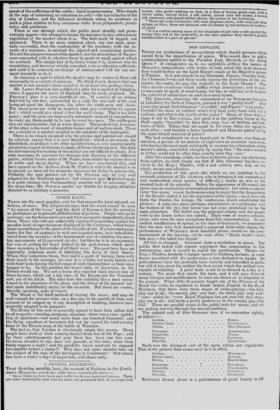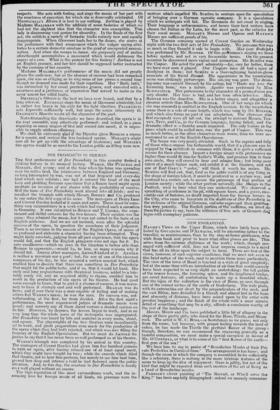DON GIOVANNI.
THERE are productions of an excellence which should preserve them sacred from the impertinence of praise. Who would dare to add a commendatory epithet to the Paradise Lol, Macbeth, or the Fairy Queen ? It exasperates us to see scribblers defiling the names of MOZART'S compositions with terms of laud, which the next moment they would bestow on the Lord Mayor's coach or his Majesty's palace at Pimlico. Is it not enough to say Giovanni, Faro, Cosijart tulle, La Clemenza ?—do not these words express the perfections of the romantic, the comic, the gay, the majestic, in the Lyric Drama? The titles denote excellence which baffles verbal description ; and it were as necessary to speak of sweet honey, hot fire, or cold ice, as to bestow the epithets of admiration on such honoured names.
The American, observing the amazement of an European traveller at beholding the Fails of Niagara, guessed it was "pretty droll." Our every-day people find Giovanni" beautiful," and Figaro "very pretty:' Consider the mass of rubbish which they laud every hour with these epithets, and what is the worth of the praise Many of these folks- name it not to BRUM:AMA., nor speak it in the printing-house of the Bull—apply "beautiful" to their fish, soup, legs of mutton, and buttocks of beef. Timings that are equal to the same thing are equal to each other ; and imagine a horse mackerel and MozanT paired off by the same insipid measure of praise ! The best compliment we ever heard paid to MOZART, was from an amateur, a person of no powers of expression on common occasions, who having laboured most awkwardly to enounce his admiration of the master's music, concluded abruptly by saying that "the notes seemed as if they could not be other than exactly what they were." After this exordium, which we have written to excuse our abstinence from epithet, we shall simply say that 11 Don Giovanni has been revived at the King's Theatre, with a cast entirely new, and, on the whole, strong and effective. The production of this opera (for which we are indebted to the accurate judgment of Mr. Avaron, who in bringing it out encountered and surmounted every species of difficulty,) marks an mra in the musical taste of the country. Before the appearance of Giovanni, the opera was an exclusively aristocratical amusement: but when we use t he term "the opera," we are farfrom meaning to imply that the frequenters of the theatre visited it for the enjoyment of the opera,—no, it was with them the theatre, the lounge, the rendezvous, which constituted the pleasure. A song, or a piece, perhaps, Was admired, or a performer was the fashion of the day, but music was not even pretended to be the main attraction. The ballet was the principal charm, and few people went to the house before ten o'clock. There were of course Connois seurs, who were the rare exceptions from this representation. In our earliest recollections of operas, in the days of GRASSINt, we remember that the men who had maintained a perpetual tittle-tattle during the performance of WINTER'S most beautiful pieces, would on the commencement of the dancing, cry to each other, " Hush, hush i—don't talk now,—the ballet has begun." All this is changed. Giovanni dates a revolution in music. The public first tasted with sincere enjoyment fine composition in this performance, and it sought to repeat the gratification. Thence the King's Theatre, formerly a temple sacred to 'Fashion, became, in some degree accordant with its• pretensions, a fane dedicated to Apollo. Its performances have too generally been slovenly and imperfect in parts, but still it has given the million the best music which the million were capable of relishing. A good taste is not to be formed in a day or a century. We must first create the taste, and it will pass through many changes and modifications to such excellence as is attainable in the a When little SALOMON taught one of the Princes of the Blood the violin, he explained in broad broken English to his Royal Highness, that there were three stages of violin-playing,—the first, play not at all ; the second, play very bad ; the third, play very well: "now," added he, "your Royal Highness has got over the first stage, play not at all ; and made a pretty proficiency in the second, play vary bad." There are parallel stages in the public taste for music, and we are making our way through the second condition. The original cast of Don Giovanni was, if we remember rightly, as follows:— Zerlina, FODOR.
C‘
Donna Anna MPORESE,
Elvira, Miss Hu ou ES.
Giovanni, AMBROGETT1.
Leporello, . . . • NALD1. Ottavio CRIVELLI Masetto, ANGRISANI.
Such was the strongest cast of the opera within our experience. That of the present time comes next to it in effect. Donna Anna Zerlina, MALIBRAN.
Elvira,
So NT 4.G MONT [CELLI.
ZUCIIELLI.
Giovanni, PELLEGRINI, Leporello, DO NZ ELLI. Ottavio . GRAZIANI.
Mat etto,
SONTAG'S Donna Anna is a performance of great beauty in all respects. She acts with feeling, and sings the music of her part with i the exactness of execution for which she s deservedly celebrated.Of MONTICELLI'S Elvira it is best to say nothing. Zer.lina is played by Madame MALIBRAN with the addition of some fooleries, of which we had not the slightest idea that the character was susceptible. This lady is discovering vast genius for absurdity. In the finale of the first act, she exhibits a variety of fantastic tricts entirely new and equally inappropriate. When Giovanni leads her to the dance, she stares at the performers with that amazement which the vulgar saying attributes to a certain domestic creature in the grief of unexpected assassination. And when she essays to dance, she purposely and of malice aforethought accomplishes a movement which would dishonour the capers of a cow. What is the pretext for this foolery? Zerlina is not an English peasant, and her feet should be supposed better instructed by the customs of her country. Madame MALIBRAN'S performance of the music did not greatly please the audience; but as the absence of encores had been remarked upon, she was so obliging as to sins" some of her pieces a second time though no demand was made for their repetition. Her " Batti,'hatti," was untouched by her usual pernicious graces, and executed with a sweetness and a prettiness of expression that served to make us the more 7ament her wilful faults. .
DONZELLI'S Ottavio is the best we have ever. heard, and that by a long interval. ZOCHELLI sings the music of Giovanni admirably, but is rather too heavy in his style for the light libertine. PELLEG. RINI acts Leporello sufficiently well, but sings the songs infamously ill. GRAZIANI'S Masetto wants all the character of the part.
Notwithstanding the drawbacks we have described, the opera is in the tout ensemble, very effectively performed; and indeed, in a piece requiring so many singers of first and second rate merit, it is impossible to supply uniform efficiency. We shall be extremely glad if the Director gives ROSSINI a repose for a season, and revives the less hacknied operas. MOZART'S might now all be got up with the advantage of freshness ; and WINTER'S fine operas would be as novel to the London public as if they were new.



















 Previous page
Previous page